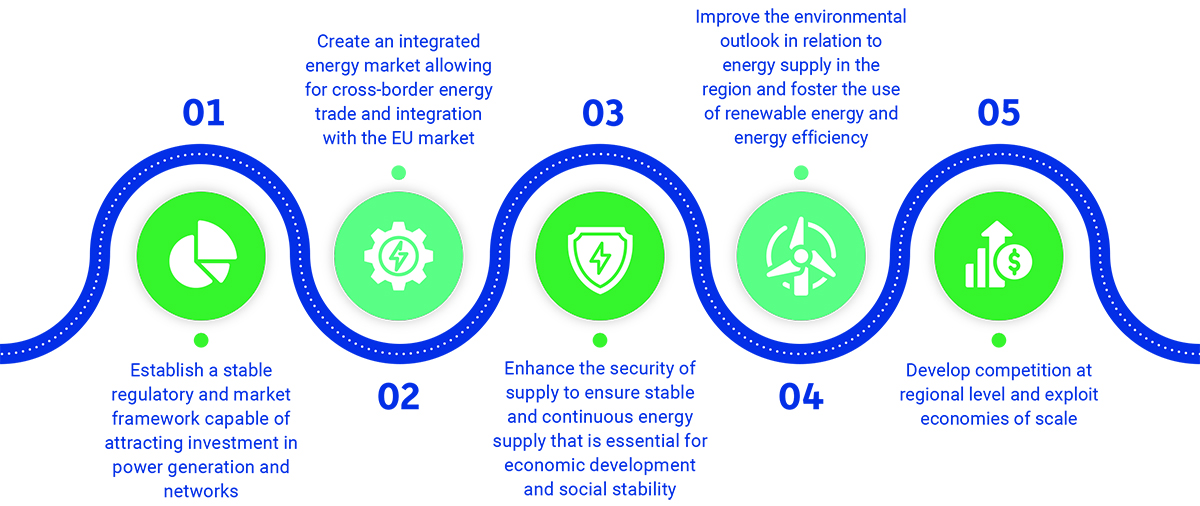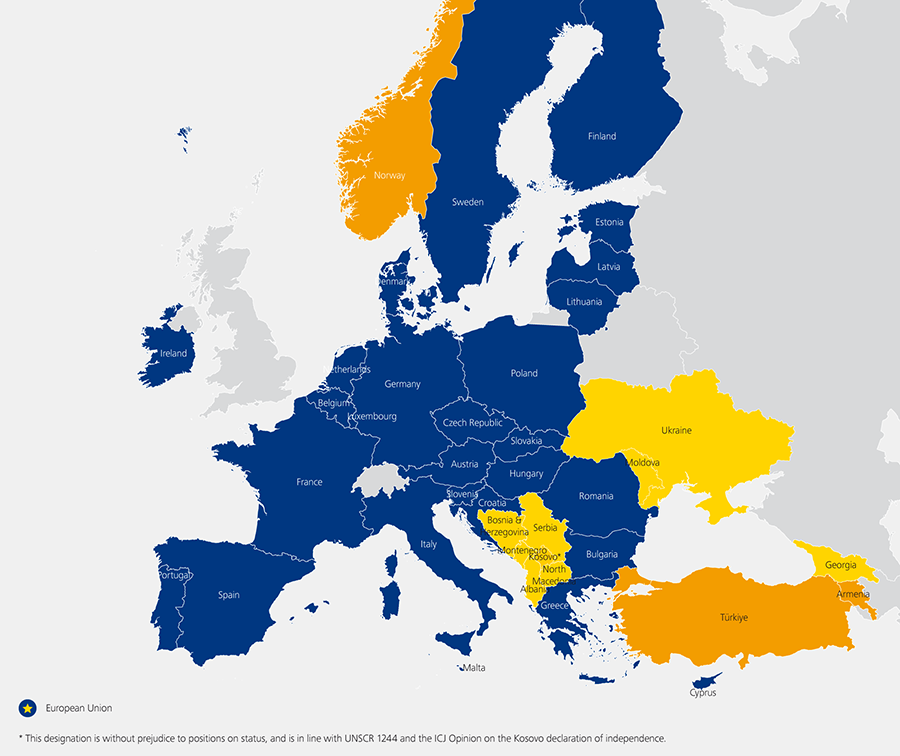 Albania
Albania
- Status
- Contracting Party
- Day of accession
- 1 July 2006
The Energy Community is an international organisation which brings together the European Union and its neighbours to create an integrated pan-European energy market. The organisation was founded by the Treaty establishing the Energy Community signed in October 2005 in Athens, Greece, in force since July 2006. The key objective of the Energy Community is to extend the EU internal energy market rules and principles to countries in South East Europe, the Black Sea region and beyond on the basis of a legally binding framework.
The mission of the Energy Community Treaty is to:

The Energy Community has nine Contracting Parties - Albania, Bosnia and Herzegovina, Kosovo*, North Macedonia, Georgia, Moldova, Montenegro, Serbia and Ukraine.
The European Union is a Party to the Energy Community Treaty. Represented by the European Commission, it serves as a permanent Vice-President of the organisation. Any European Union Member State may obtain the status of a Participant.
Armenia, Norway and Türkiye take part as Observers.
By hovering over the country name on the map, you can access contact information of key energy stakeholders. For Contracting Parties, you also have quick access to country documents and acquis implementation sections.




Ministry of Infrastructure and Energy
Bulevardi "Dëshmorët e Kombit", 1001 Tirana
Tel: +35542222245
Send e-mail
Visit website
Albanian Energy Regulatory Authority (ERE)
Bulevardi Gjergj Fishta Nr 10, Tirana
Tel: +35542258112
Send e-mail
Visit website
Ministry of Foreign Trade and Economic Relations of Bosnia and Herzegovina
TRG BiH 1, 71000 Sarajevo
Tel: +38733214102
Send e-mail
Visit website
State Electricity Regulatory Commission
Miška Jovanovića Street 4/II, 75000 Tuzla
Tel: +38735302070
Send e-mail
Visit website
Federal Ministry of Energy, Mining and Industry
Alipašina 41, Sarajevo
Tel: +38733226493
Send e-mail
Visit website
Regulatory Commission for Electricity in Federation of Bosnia and Herzegovina
Blajburških žrtava br. 33, 88000 Mostar
Tel:+ 38736449900
Send e-mail
Visit website
Ministry of Industry, Energy and Mining of the Republic Srpska
1 Trg Republike Srpske; 78000 Banja Luka
Tel: +38751339581
Send e-mail
Visit website
Regulatory Commission for Energy of the Republic Srpska
7, Kraljice Jelene Anzujske Street, 89101 Trebinje
Tel: +38759272400
Send e-mail
Visit website
Energy Regulatory Commission
Street Macedonia b.b, Lazar Pop Trajkov 6th floor,
1000 Skopje
Tel: +38923233580
Send e-mail
Visit website
Ministry of Economy and Sustainable Development
Sanapiro str. Nr.2
Tbilisi, 0105
Tel: +995322357804
Send e-mail
Visit website
Georgian National Energy and Water Supply Regulatory Commission
19 A. Mitskevichi Street,
Tbilisi
Tel: +995322420180
Send e-mail
Visit website
Ministry of Economy
Square "Zahir Pajaziti", No.36,
10000 Prishtina
Tel: +3820021500
Send e-mail
Visit website
Energy Regulatory Office
Dervish Rozhaja street No 12,
1000 Prishtina
Tel: +38138247615
Send e-mail
Visit website
Ministry of Infrastructure and Regional Development
str. Piaţa Marii Adunări Naţionale 1,
MD-2033, Chişinău,
Tel: +37322250535
Send e-mail
Visit website
National Energy Regulatory Agency, ANRE
str. Columna 90,
MD-2012 Chisinau
Tel: +37322541384
Send e-mail
Visit website
Ministry of Economic Development
Rimski trg 46,
81000 Podgorica
Tel: +38220482203
Send e-mail
Visit website
Energy Regulatory Agency
Bulevar Svetog Petra Cetinjskog 96,
81000 Podgorica
Tel: +38220229615
Send e-mail
Visit website
Ministry of Mining and Energy
Nemanjina 22-26,
11000 Belgrade
Tel: +38113346755
Send e-mail
Visit website
Energy Agency of the Republic of Serbia
5 Terazije, V floor,
11000 Belgrade
Tel: +381113033829
Send e-mail
Visit website
Ministry of Energy and Coal Industry of Ukraine
30, Khreshchatyk str.,
01601 Kyiv
Tel: +380442349388
Send e-mail
Visit website
National Energy and Utilities Regulatory Commission
vul. Smolensk, 19
03057 Kyiv
Tel: +380442044827
Send e-mail
Visit website
European Commission Directorate General Energy
Rue J.-A. Demot, 24-28, B – 1040 Brussels, BELGIUM
Tel: +3222991111
Council of European Energy Regulators (CEER)
Cours Saint-Michel 30a, (5th floor), Securex building, 1040 Brussels, BELGIUM
Tel:+3227887330
Agency for the Cooperation of Energy Regulators (ACER)
Trg republike 3, 1000 Ljubljana, SLOVENIA
Tel: +38682053400
A strong institutional setting supports the Energy Community process.
As the highest decision-making body, the Ministerial Council meets once a year to set key priorities and steer the implementation of the Treaty. The work of the Ministerial Council is prepared by the Permanent High Level Group (PHLG), which meets every three months.
The Secretariat is the only permanently acting institution of the Energy Community responsible for supporting the organisation's day-to-day activities and monitoring the implementation of the Treaty. Energy Community Regulatory Board (ECRB) is a coordination body of the national energy regulators, which fosters the exchange of knowledge and development of best practices. ECRB's permanent staff members form a unit within the Secretariat.
Fora, specialised Working Groups and Task Forces also support the Energy Community’s work. The Energy Community Parliamentary Plenum brings together elected members of parliament to make the Energy Community better equipped to adopt and implement the acquis. In addition, the Energy Community regularly engages with its stakeholders, including civil society, investors and donors.
The Energy Community in action
Every year, the Secretariat publishes an Annual Implementation Report, which outlines the progress achieved by each Contracting Party in implementing the Energy Community acquis in force. The report presents the Contracting Parties' performance in five clusters covering markets, security of supply, sustainability, environment and authorities.
Due to the war, Ukraine’s energy infrastructure is in critical condition and fuel supplies are at risk. The Energy Community Secretariat, based on the direct request of the Ministry of Energy of Ukraine, is coordinating the delivery of specialized energy equipment, fuels and materials donated by private companies in order to repair infrastructure damaged during the war and keep Ukraine’s energy system functional.
The Secretariat launched the Energy Community Just Transition Initiative to ensure that the move away from fossil fuels in the Contracting Parties is socially just, in the interest of women, workers and entire communities. The Secretariat manages four interlinked projects focusing on: energy poverty, gender equality, coal regions in transition and clean air regions (CARI).
EU4Energy Project Phase II fosters the clean energy transition and decarbonisation in Georgia, Moldova and Ukraine. The action provides support in evidence-based energy policy design and the transposition and implementation of the Energy Community acquis.
The South-East European Gas (SEEGAS) Initiative fosters closer cooperation between stakeholders to enable further market opening, establish organized gas exchanges and improve cross-border trading and ultimately benefit end-consumers. It is also working to identify possible measures to mitigate gas supply risks in case of Russian gas supply disruption.
Article 67 of the Treaty tasks the Secretariat to “review the proper implementation by the Parties of their obligations under this Treaty, and submit yearly progress reports to the Ministerial Council”. In addition to the Treaty, the acquis in force together with the amending Ministerial Council decisions give rise to a series of reporting obligations. More than 50 Articles task the Secretariat to monitoring and reporting.
The acquis also equips the Contracting Parties with several, evolving reporting obligations.
The Energy Community website consists of a vast number of documents, displayed in different sections of the site: EVENTS, LEGAL SECRETARIAT and ECRB. Whilst all the meeting documents - agendas, conclusions, and presentations, can be found in the EVENTS section, the LEGAL section groups together the Energy Community acquis, Decisions, Procedural Acts, Opinions and the Cases registry.
In SECRETARIAT and ECRB you will find reports written by the two institutional bodies. Whilst the majority is a direct outcome of its reporting obligation, the Secretariat also reviews and reports upon Contracting Party's request. Sometimes it writes a paper to evoke discussion in the institutional bodies. The ECRB reports are a result of the task assigned by the work programme or an obligation arising from the acquis.
In case a document is not displayed neither under EVENTS, nor under LEGAL, interested persons may request access to such document in line with the Rules on Public Access to Documents of the Secretariat (PA 2021/03/ECS-EnC). Please send any such request to the designated member of the Legal Unit.
Please note that no documents older than seven years are displayed on these pages.